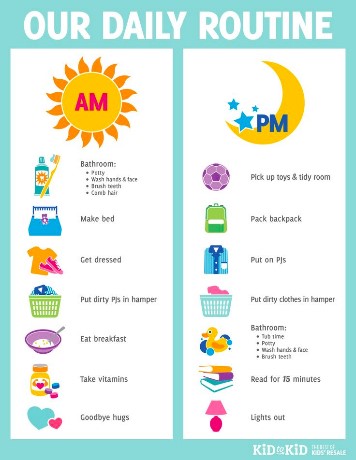Tips for making daily life easier with kids while you are home and working!
news-article
July 1, 2020
Many parents are still trying to juggle working from home while taking care of their children. Here are some tips and suggestions on how to make the upcoming summer/months more productive and easier!
 Routine: Just because your kids are not at school or in camp, doesn’t mean you can’t have a schedule or routine each day. Try to follow a schedule similar to your child’s typical school day. Be sure to include some outside time, snacks, free play, etc. A predictable routine each day can help decrease your child’s anxiety about what to expect. It may be helpful to go over the schedule each night before bed.
Routine: Just because your kids are not at school or in camp, doesn’t mean you can’t have a schedule or routine each day. Try to follow a schedule similar to your child’s typical school day. Be sure to include some outside time, snacks, free play, etc. A predictable routine each day can help decrease your child’s anxiety about what to expect. It may be helpful to go over the schedule each night before bed.
- There are some apps that help you make schedules such as Choiceworks, kids to do list, or just write or draw one out on paper!
 Movement Breaks: Make sure to incorporate as many movement breaks as possible to help kids stay regulated throughout their day. Make obstacle courses using some of these activities. Focus on heavy work activities that provide input to their joints such as:
Movement Breaks: Make sure to incorporate as many movement breaks as possible to help kids stay regulated throughout their day. Make obstacle courses using some of these activities. Focus on heavy work activities that provide input to their joints such as:
- Weightbearing activities e.g. crawling, push-ups, animal walks, wheelbarrow walks, pushing trucks around
- Resistance activities e.g. pushing/pulling, using therabands, digging, raking, using kinetic sand, shoveling
- Heavy lifting e.g. carrying books, carrying laundry baskets, building sand castles, carrying buckets of water
- Cardiovascular activities e.g, running, jumping on a trampoline, walking up steps, rolling down hills
- Oral activities e.g. chewing snacks, blowing bubbles, bubble gum
- Deep pressure e.g. tight hugs, squeezes under pillows, body socks, crawling through tunnels
- Difficult Behaviors: Expect your children to demonstrate more behaviors and dysregulation. Children pick up on subtle changes in routine and families anxiety/stress very easily. Even if your child can’t verbally express their confusion or anxiety, they most likely know something is different. These feelings are often exhibited with less frustration tolerance, more limit/boundary testing, increased tantrums, more dysregulation.
- Develop a sensory corner in your household to help with dysregulation, include a tent, soft pillows, dim lights, weighted blankets, quiet music, books or other low-stimulation activities
- Incorporate sensory breaks in your daily routine
- Explain to children why things are different in age appropriate ways (see social stories on COVID)
- Get outside! Changing the environment can be helpful even if it’s just your porch, basement or backyard
- Reach out to your behavioral specialist for more specific information regarding challenging behaviors
Stefanie Larsen, OTR/L
